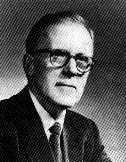Donald Hebb
| Donald Olding Hebb | |
|---|---|
 |
|
| Born |
July 22, 1904 Chester, Nova Scotia, Canada |
| Died | August 20, 1985 (aged 81) Chester, Nova Scotia, Canada |
| Nationality | Canadian |
| Fields | Psychologist |
| Institutions |
Montreal Neurological Institute, Queen's University, Yerkes Laboratories of Primate Biology, McGill University |
| Alma mater |
Dalhousie University, McGill University, Harvard University |
| Known for | Cell assembly theory |
| Notable awards | Fellow of the Royal Society |
Donald Olding Hebb FRS (July 22, 1904 – August 20, 1985) was a Canadian psychologist who was influential in the area of neuropsychology, where he sought to understand how the function of neurons contributed to psychological processes such as learning. He is best known for his theory of Hebbian learning, which he introduced in his classic 1949 work The Organization of Behavior. He has been described as the father of neuropsychology and neural networks. A Review of General Psychology survey, published in 2002, ranked Hebb as the 19th most cited psychologist of the 20th century. His views on learning described behavior and thought in terms of brain function, explaining cognitive processes in terms of connections between neuron assemblies.
Donald Hebb was born in Chester, Nova Scotia, the oldest of four children of Arthur M. and M. Clara (Olding) Hebb, and lived there until the age of 16, when his parents moved to Dartmouth, Nova Scotia.
Donald's parents were both medical doctors. Donald's mother was heavily influenced by the ideas of Maria Montessori, and she home-schooled him until the age of 8. He performed so well in elementary school that he was promoted to the 7th grade at 10 years of age but, as a result of failing and then repeating the 11th grade in Chester, he graduated from the 12th grade at 16 years of age from Halifax County Academy. (Many or most of the single class of grade 9, 10 and 11 students at the Chester school failed the provincial examinations. Those in 9th and 10th grades were permitted to advance despite their failure but there was no 12th grade in Chester.) He entered Dalhousie University aiming to become a novelist. He graduated with a Bachelor of Arts degree in 1925. Afterward, he became a teacher, teaching at his old school in Chester. Later, he worked on a farm in Alberta and then traveled around, working as a laborer in Quebec.
...
Wikipedia
